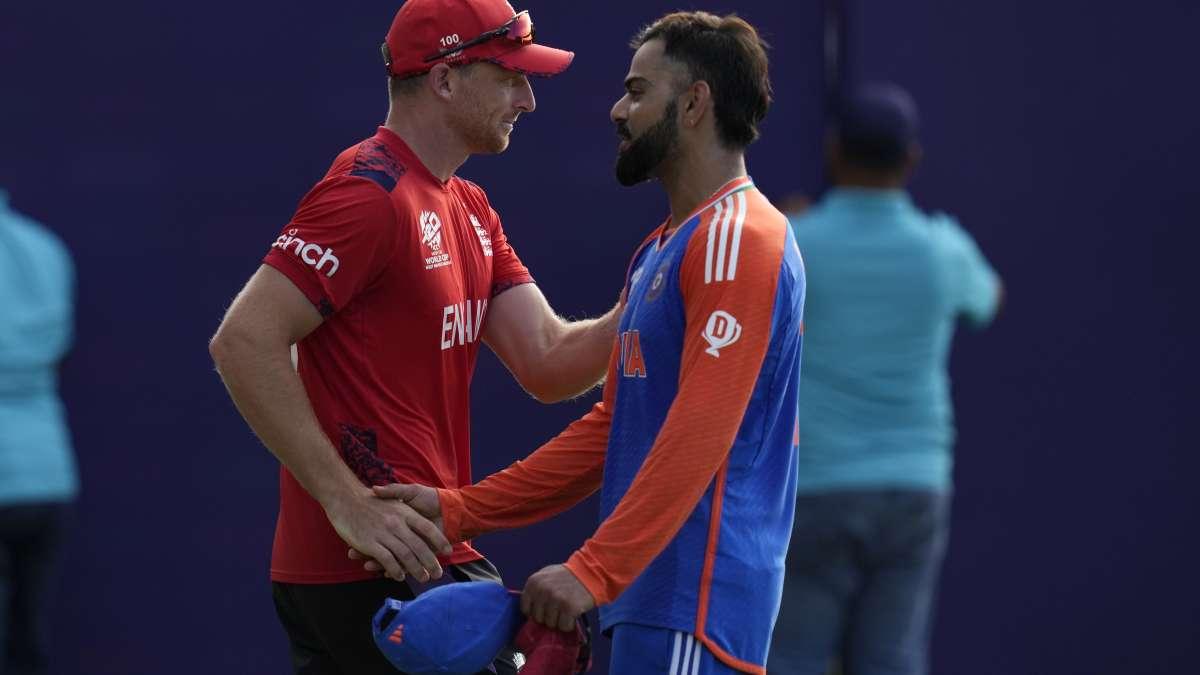
England captain Jos Buttler has admitted his biggest tactical mistakes in the semi-final loss at the hands of India at the Providence Stadium in Guyana. England’s quest to chase down 172 runs ended in dismal fashion, as they were bowled out for just 103 runs after opting to bowl first. Buttler has stood by his decision during the toss, asserting that the game wasn’t ultimately won or lost at that stage. However, he did admit to an error regarding his choice of bowlers, lamenting the fact that he did not utilize his third available spinner at all during the innings.
Adil Rashid and Liam Livingstone displayed an effective show, conceding only 49 runs collectively across eight overs, with Rashid managing to dismiss the crucial wicket of Rohit Sharma. However, the England pacers were less effective, conceding a punishing 120 runs in the remaining 12 overs, which significantly impacted their chances. Despite having another off-spinner, Moeen Ali, in their line-up, Buttler chose not to use him, probably due to match-up considerations. Reflecting on this decision, Buttler expressed regret, acknowledging that given the conditions, it would have been judicious to introduce Moeen, especially considering how challenging it was for batsmen to score off spin bowling.
“I thought we bowled a little bit without luck in the power play, with a few close calls there,” Buttler conceded post-match. “But yes, in hindsight, reflecting on the game, I would undoubtedly have brought Moeen [Ali] into the game. Small factors here and there add up, and it’s definitely disappointing. India outplayed us completely, and they deserved the victory. They managed an above-par score, and I had hoped to restrict them to 145 – 150 on that pitch. Given that target, it was always going to be a tough chase.”
In contrast, India’s spinners were brought into the attack early on, with Axar Patel making an immediate impact by dismissing the England captain off the very first ball he faced. Axar and Kuldeep Yadav shared six wickets evenly, while Ravindra Jadeja, although wicketless, still made it challenging for the England batsmen to score. Buttler praised the Indian spinners, admitting that the Indian bowling unit outperformed their English counterparts.
“India obviously has some fantastic spinners. Our two guys bowled well, but looking back, I should have brought Moeen [Ali] in during the innings, considering how spin was playing out,” Buttler commented.
. “With the rain around, I didn’t think the conditions would change as drastically as they did. And in reality, it didn’t seem to change that much. The Indian spinners out-bowled us, and they posted an above-par score. While it’s easy to blame the toss, in the end, I don’t think it was the determining factor between our teams.”
The post-match reflections highlight crucial moments and decisions that may have altered the game’s outcome for England. The strategic decision to bowl first might have seemed logical initially, but the effectiveness of spin bowling in the given conditions was underestimated. The choice of bowlers and when they were brought into play also had significant ramifications, which Buttler acknowledged with regret post-match.
India’s approach, on the other hand, was tactically precise and ruthlessly executed, echoing years of experience in dealing with high-pressure situations in tournaments. Their bowlers, led by spinners, targeted England’s weaknesses efficiently, giving little to no room for error, which Buttler openly admired.
With this defeat, England’s journey in the tournament comes to an end, bringing about a period of reflection and analysis. The performance points to a need for more robust strategies and adaptability in volatile conditions. Tactical decisions, as minor as they might seem in the moment, can have sweeping impacts on the outcome of the matches, a lesson that Buttler and his squad will undoubtedly take to heart.
Meanwhile, India progresses to the final, breaking a 10-year semi-final jinx in the ICC T20 World Cup. Captain Rohit Sharma’s tactical prowess, especially his decision to bring in spinners early on, paid rich dividends, marking another successful chapter in his leadership record. The road ahead for India looks promising as they eye the coveted T20 World Cup title, driven by a finely balanced blend of experience and tactical acumen.
Related Stories
India need to defy 10-year-old history to make way into T20 World Cup 2024 final.
India break ICC T20 World Cup semi-final jinx after 10 years, thrash England to enter 2024 final.
Rohit Sharma becomes the most successful captain in men’s T20Is, eclipsing Babar Azam.
Thus, as England regroups and re-strategizes, the semi-final serves as a crucial learning curve in the volatile, fast-paced world of T20 cricket.










